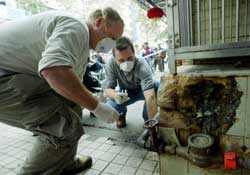Experts scour apartment block in SARS probe
( 2004-01-11 16:48) (chinadaily.com.cn and agencies)
Doctors from the World Health Organization (WHO) scoured on Sunday a southern Chinese apartment block where China's only confirmed new SARS case lived in, looking for clues as to how the 32-year-old freelance TV worker caught the flu-like virus.
The WHO was also no closer to determing whether a suspected SARS case, a waitress who worked in an exotic food restaurant in southern China, actually had the mysterious disease.
 |
| Doctors of the World Health Organisation (WHO) investigation team collect samples at a seafood and exotic game restaurant temporarily closed by authorities in the southern Chinese city of Guangzhou, January 10, 2004. [Reuters] |
"We're at the apartment building talking to the building management, looking at the ventilation systems, the sewage systems and things like that," WHO spokesman Roy Wadia told Reuters by telephone from the southern city of Guangzhou.
China confirmed last Monday its first case of Severe Acute Respiratory Syndrome since a world outbreak was declared over in July. The patient, a Guangzhou television producer, recovered and left hospital on Thursday.
Health officials said a gene sample from the man matched that of a coronavirus found in civets, a weasel-like animal eaten as a delicacy in southern China and sold in crowded markets.
Experts suspect the virus jumped from civets to humans. The television producer denied any contact with civets but authorities ordered a cull of the animals in the hope of averting a repeat of last year's SARS outbreak, which swept out of southern China and infected about 8,000 people around the world, killing about 800 of them.
SEARCHING, TESTING
The WHO investigators on Saturday searched the seafood and game restaurant in an old quarter of Guangzhou city where the woman suspected of having SARS worked as a waitress. The restaurant had civets on its menu.
The WHO also recommended that health officials send samples from the woman to laboratories in Beijing and abroad for more tests.
"We have no further information on the second case," Wadia said about the 20-year-old waitress, who has been in stable condition without fever for more than a week.
About 100 people who had contact with the woman have been free of fever and other SARS symptoms, the Xinhua news agency said.
A Guangdong provincial panel would make the final diagnosis of the woman and would not take as long as the man's diagnosis, which dragged on for more than a week after he was first declared a suspect, state media said.
SARS is believed to be spread by droplets in coughs and sneezes. It has no specific cure but doctors worldwide treat it with ribavirin, an anti-viral drug, and steroids.
To combat the spread of the disease, which killed nearly 350 people in China last year, the Beijing Youth Daily said the State Food and Drug Administration had approved four new medicines for prevention and treatment.It gave no details, but said three other SARS medicines had entered the clinical testing stage.
|

